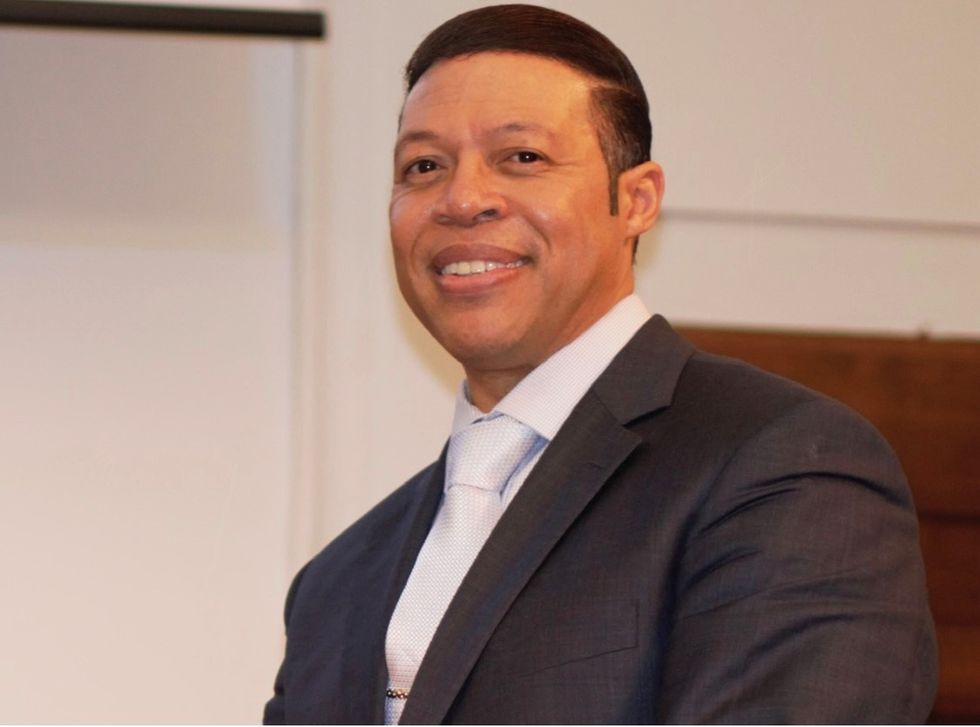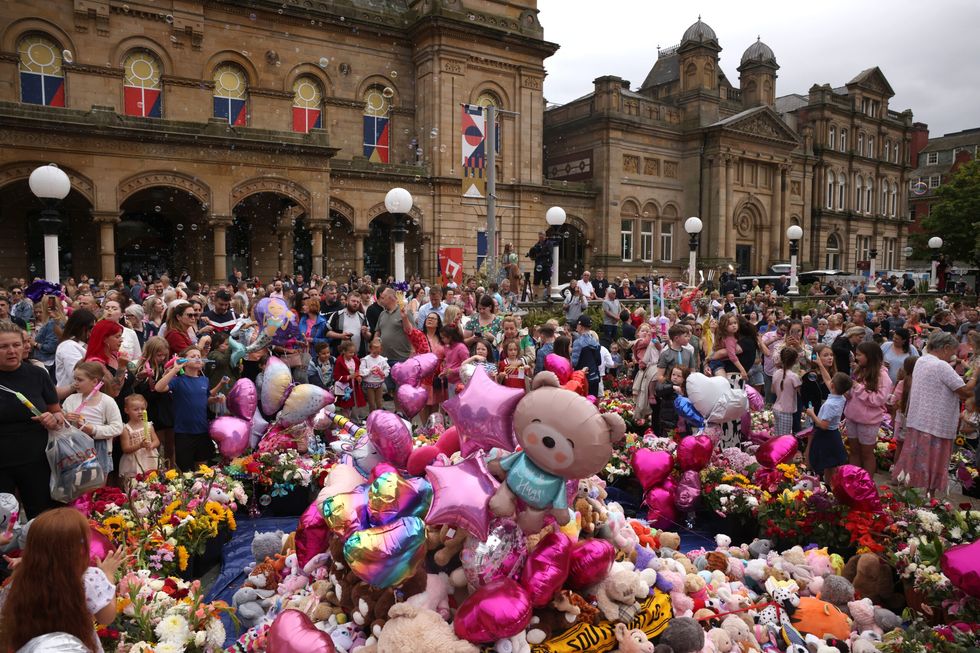SPEEDY convictions and the sentencing of perpetrators behind the recent violent public disorder in towns and cities across England are sending a message of deterrence as well as reassurance for communities that there will be consequences for actions, a senior criminal justice official has said.
Lionel Idan is the chief crown prosecutor for London South and CPS (Crown Prosecution Service) national lead for hate crime.
In an interview with Eastern Eye last Friday (9), he hoped the swift action by the police and courts in recent days served as a “warning to those who are tempted, who might think it’s just a post, it’s just a tweet, but actually, if you cross that line into criminality, we will prosecute you, and you will get significant sentences”.
He also stressed the significance of building and retaining trust in communities and the criminal justice system.
“Trust underpins everything we do, and if we don’t have that trust, we can’t bring offenders to justice,” Idan said.

More than 500 people have been charged for taking part in riots across England, following a July 29 stabbing which left three young girls dead.
On Monday (12), two 12-year-old boys admitted to their involvement in the disorder, becoming the youngest to confess to taking part in the riots.
One of the boys pleaded guilty to two charges of violent disorder at a court in Manchester. He was accused throwing a missile at a police van during as part of a group that gathered outside a Manchester hotel housing asylum seekers.
Idan described how prosecutors in London, Liverpool and other areas were working round the clock to bring charges as police investigated cases and authorities acted to clamp down on violent demonstrations targeting asylum seekers, refugees and minority groups.
“As soon as the police have someone, we can give real time advice,” Idan said, in contrast to normal times when the police investigate a case and refer it to the CPS in a process that takes a few days or weeks before a conviction is secured.
“What we’re doing is literally being in touch with the police throughout the day… the night, and giving advice on charge; that’s why we’re able to deal with these cases much more quickly,” he said.
“We’ve got people on standby. If there’s any concern around a sudden spike, we can respond, because we have got people on standby as well.
“It is so important that there is a strong public message this sort of behaviour is not acceptable, the quicker you can deal with that behaviour, the quicker that message can get through.
“That’s why we’re throwing everything we can at this to make sure we get those decisions quickly and those cases through the court system. We’re getting sentences quickly, they’re not being adjourned off.
“The prison service, the court service, us, the police, the judiciary. Everyone’s working closely on this.”
The far-right violence came after misinformation spread about the identity of the alleged perpetrator of the mass stabbing at a Taylor Swift-themed dance class in the seaside town of Southport. False rumours spread online that the perpetrator was a Muslim asylum seeker, sparking the disturbances. A 12-year-old boy admitted to violent disorder in Liverpool youth court for his role in riots in Southport the day after the knife attack. He will be sentenced on September 17.
Others included a 16-year-old girl and a 17-year-old boy who pleaded guilty to violent disorder at Plymouth Magistrates’ Court. There have been no major incidents reported since last Wednesday (7).
But the protests have left scores of police officers injured and a number of businesses were looted.
Hotels housing asylum seekers were attacked and mosques were targeted in Southport, Liverpool and Sunderland.
More than 900 people have so far been arrested and around 500 charged with various offences, including for criminal damage and online hate speech.
Some of those convicted have already been jailed for years-long terms.
Idan conceded it was hard to pin down the reasons for the flare-up of violent disorder as it can be difficult to predict how things will turn. He cited the case of a defendant at his 18th birthday, who left the celebration at home to commit crime.
“I mean, you cannot predict (it). Sadly, we’ve seen people with no previous convictions getting involved. The drivers for this, whether it’s social media, something else, it’s unpleasant, and it’s very difficult to predict at the moment,” he said.
What Idan was certain about, though, was the deterring effect of swift justice.
He recalled how in August 2011, as civil unrest spread across London and other cities, “when we were getting sentences quickly, we certainly saw a deterrent effect”.
He added, “So there is no doubt that doing this swiftly is sending a message.
“Now, that message is one of deterrence, that you will be found, taken to court, prosecuted and sentenced. It’s certainly going to put some people off, I hope, from doing what they’re doing, but I also hope it gives a bit of reassurance to our communities. We have heard stories of the fear, distress, anguish, that sense of not knowing whether it’s going to be you, your family, friends, your home, place of worship – that’s awful.

“Not many people, unless you felt it, can grasp that feeling of fear and uncertainty. So, I really hope it’s not just a deterrent effect, but what we’re doing will provide some reassurance to people that you cannot if you do this, you cannot hide between us and the police, we will find you and we will prosecute you.”
Prime minister Sir Keir Starmer, a former head of the prosecution service, has vowed to deliver swift justice to deter more violence and some sentencings have been televised, a rarity in Britain.
Police have also churned out names and photos of those convicted, in a bid to make the criminal justice system’s response highly visible.
The importance of such measures is not lost on Idan. He said, “Simply because we charge cases quickly, everyone trusts the system, everyone trusts the police. That would actually be very naive. We have to do so much more work around building trust and retaining trust.
“For me, building confidence, building trust, it’s not a one-off. You don’t just do something as a flash in the pan and somehow everyone trusts you.
“We have got to look how we engage, how we communicate, whether we drop a case, whether we charge a case, or we don’t charge a case.
“These are all key issues we’ve got to think about, how we support victims from particular communities, how we do it, do we actually listen and learn if something goes wrong, if we get feedback?
“These are all the factors, the pillars that build trust. These are all just small threads we need to weave together, and it’s not the one answer.
“Trust underpins everything we do, and if we don’t have that trust, we can’t bring offenders to justice. The members of the community sit on juries. Members of the community have to report crime, have to be witnesses. If they don’t have trust in the system, how can we expect to bring justice?
“It’s key that we continue to build that confidence and retain it, as well.

















 Kap’s Cafe in Surrey was struck by gunfire late at night with staff still insideInstagram/
Kap’s Cafe in Surrey was struck by gunfire late at night with staff still insideInstagram/ Kaps Cafe Instagram Story Instagram Screengrab/
Kaps Cafe Instagram Story Instagram Screengrab/ Kaps Cafe Instagram Story Instagram Screengrab/
Kaps Cafe Instagram Story Instagram Screengrab/

